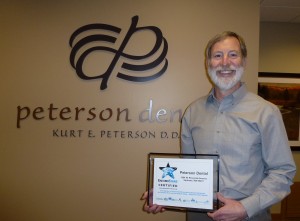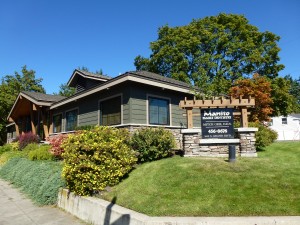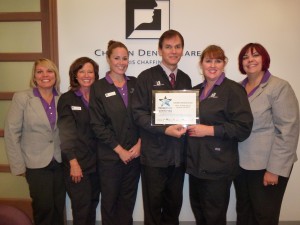EnviroStars teams up with area dentists
It may come as a surprise to many, but dentists are responsible for keeping more than our teeth  healthy. Our river, too, depends on them to employ safe business practices. According to the Association of Metropolitan Sewerage Agencies, dental clinics are the single greatest cause of mercury in waste water treatment plants. They represent 40% of the total, or over three times the next highest contributor. Why? Because amalgam fillings, often referred to as “silver fillings” for their color, contain 50% liquid mercury. With a grant from the Washington Department of Ecology, Spokane EnviroStars is working to certify dentists who are properly maintaining amalgam separators to keep mercury out of our wastewater stream. Other certification criteria include things like going digital or properly managing waste from chemicals used to produce x-rays. Three dental offices, (Peterson Dental, Chaffin Dental Care and Orsi Dental ) have helped launch the
healthy. Our river, too, depends on them to employ safe business practices. According to the Association of Metropolitan Sewerage Agencies, dental clinics are the single greatest cause of mercury in waste water treatment plants. They represent 40% of the total, or over three times the next highest contributor. Why? Because amalgam fillings, often referred to as “silver fillings” for their color, contain 50% liquid mercury. With a grant from the Washington Department of Ecology, Spokane EnviroStars is working to certify dentists who are properly maintaining amalgam separators to keep mercury out of our wastewater stream. Other certification criteria include things like going digital or properly managing waste from chemicals used to produce x-rays. Three dental offices, (Peterson Dental, Chaffin Dental Care and Orsi Dental ) have helped launch the  EnviroStars dental program. Our goal is to certify 15 to 25 dental offices over the next year. Said Tonilee Hanson, the Spokane EnviroStars coordinator, “We hope people ask their dental office if they’re part of the EnviroStars program, or when looking for a dentist, make EnviroStars part of their decision.”
EnviroStars dental program. Our goal is to certify 15 to 25 dental offices over the next year. Said Tonilee Hanson, the Spokane EnviroStars coordinator, “We hope people ask their dental office if they’re part of the EnviroStars program, or when looking for a dentist, make EnviroStars part of their decision.”  Chaffin Dental Care is a great example of doing the right thing. Said Dr. Chaffin’s dental assistant Stephanie Michelotti, “The 1990’s controversy emerged around amalgam fillings both as a threat to patient’s health (a trace amount of mercury leaches into the mouth) and as a danger to the environment.” In the 1990’s Dr. Chaffin, wanting to put patient and community safety first, switched to composite fillings. He then installed amalgam separators in his office to recycle the mercury from old, removed silver fillings. Most recently, he eliminated chemicals from x-rays by going digital. Without amalgam separators, the task falls to waste water treatment plants, which lack the capability to completely remove the hazardous chemical. From 2003 to 2005 Ecology worked with the Washington Dental Association to phase in use of amalgam separators. For Michelotti, the issue of hazardous waste in our waterways is also personal. She comes from Arizona “where water is precious.” As a Spokane resident, she learned about the vital role the aquifer plays in our community. She wanted to “…dive in deeper to how we can be more efficient and effective because our water supply is something too many people take for granted.” She’s happy to work at Chaffin Dental Care, a clinic which “hopes their clients know that they not only care about them, but about the environment too. “
Chaffin Dental Care is a great example of doing the right thing. Said Dr. Chaffin’s dental assistant Stephanie Michelotti, “The 1990’s controversy emerged around amalgam fillings both as a threat to patient’s health (a trace amount of mercury leaches into the mouth) and as a danger to the environment.” In the 1990’s Dr. Chaffin, wanting to put patient and community safety first, switched to composite fillings. He then installed amalgam separators in his office to recycle the mercury from old, removed silver fillings. Most recently, he eliminated chemicals from x-rays by going digital. Without amalgam separators, the task falls to waste water treatment plants, which lack the capability to completely remove the hazardous chemical. From 2003 to 2005 Ecology worked with the Washington Dental Association to phase in use of amalgam separators. For Michelotti, the issue of hazardous waste in our waterways is also personal. She comes from Arizona “where water is precious.” As a Spokane resident, she learned about the vital role the aquifer plays in our community. She wanted to “…dive in deeper to how we can be more efficient and effective because our water supply is something too many people take for granted.” She’s happy to work at Chaffin Dental Care, a clinic which “hopes their clients know that they not only care about them, but about the environment too. “
